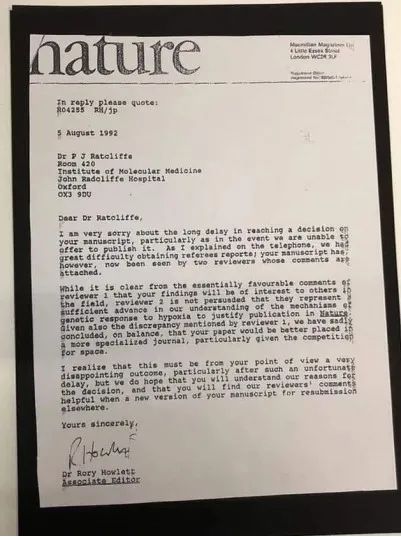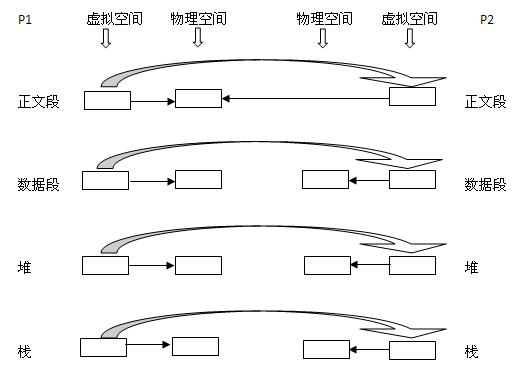搞科研
除了要有扎实的实验技能
心理素质也要过硬
要在被拒稿n次后
依旧坚强

但实际上
很多诺奖级别的研究
跟很多新手小白的遭遇也是一样的
拒稿信甚至更为扎心
比如2019年诺贝尔生理医学奖的得主
就晒出了自己1992年收到的Nature拒稿信
……

1992 年,牛津大学年轻的教授Peter J. Ratcliffe(将「低氧状态下的基因反应机制」投稿给Nature杂志,却遭到无情的拒稿,而2019年他与哈佛医学院William G.Kaelin以及约翰霍普金斯大学Gregg L.Semenza,由于在低氧感应方面做出的卓越贡献而荣获 2019 年诺贝尔生理/医学奖。

接下来我们看看审稿人给出了怎样的拒稿理由:
审稿人一:
While it is clear from the essentially favorable comments of reviewer 1 that your finding will be of interest to others in the field.
审稿人二:
reviewer 2 is not persuaded that they represent a sufficient advance in our understanding of the mechanisms of genetic response to hypoxia to justify publication in Nature.
多么熟悉的扎心的感觉啊
原来大佬们也曾被Diss
原来我们竟然跟科研大牛一样
收到过差不多内容的拒稿信
只不过大佬投是Nature…

故事的结局是
本文被PNAS杂志接收
Nature也因当年的拒稿
而错失2019年的诺贝尔生理/医学奖
曾在历史上拒绝过一大批诺奖成果
那些年被拒稿的诺奖研究
甚至都能编辑成册了
1953年诺贝尔生理学或医学奖
被Nature以“档期排满了”为理由拒稿,结果该项研究成果在影响因子很低的《酶学》杂志发表。
1979年诺贝尔化学奖
JACS的审稿人给出的拒稿……
1993年诺贝尔化学奖
被Science和Nature两大世界顶刊的审稿人同时看走眼~
Nobel prize winning ideas are not always accepted by the community。 By definition, they are paradigm shifting, revolutionary。 Accordingly, many breakthroughs that are in our textbooks today were initially rejected, if not ridiculed, by the scientific community。 Howard Temin proposed a reversal of the central dogma, wherein RNA could create DNA。 It was called “ludicrous” and his Nobel “came after a lonely battle to overcome derisive criticism from scientific leaders who refused to believe in his theory that some viruses carry their genetic information in the form of RNA, which is then copied into DNA in infected cell。
” Similarly, Werner Arber, the scientist who discovered restriction enzymes worked, “in a climate of almost total indifference, notably that of the committees and organizations tasked with allocating funds for research”Jacob 1998。Here we outline 8 Nobel prize papers that were initially rejected by anonymous pre-publication peer review and ask, “What Nobel ideas are we rejecting and/or delaying today?”
1. Nobel Prize in Chemistry (1997) awarded to Paul Boyer for: Identification of the mechanism for the synthesis of adenosine triphosphate (ATP)
Rejection: Boyer had been greeted with disbelief when he theorized that the previously mysterious process is the work of a “beautiful little machine” that operates within enzymes on the molecular level. His proposed resolution of a major unsolved problem in biochemistry threatened to “change the paradigm,” Boyer remembers, and “the leading journal” in his field -The Journal of Biological Chemistry-declined to publish his work.
Paul Boyer, Image source
2. Nobel Prize in Chemistry (1991) awarded to Richard Ernst for: The development of high resolution nuclear magnetic resonance (NMR) spectroscopy
Rejection: “The paper that described our achievements was rejected twice by the Journal of Chemical Physics to be finally accepted and published in the Review of Scientific Instruments”
Richard Ernst, Source
3. Nobel Prize in Physics (1969) awarded to Murray Gell-Mann for: “for his contributions and discoveries concerning the classification of elementary particles and their interactions”
Rejection: That was not my title, which was : Isotopic Spin and Curious Particles. Physical Review rejected “Curious Particles”. I tried “Strange Particles”, and they rejected that too. They insisted on : “New Unstable Particles”. That was the only phrase sufficiently pompous for the editors of the Physical Review. I should say now that I have always hated the Physical Review Letters and almost twenty years ago I decided never again to publish in that journal, but in 1953 I was scarcely in a position to shop around.
Murray Gell-Mann, Image from Santa Fe Institute
4. Nobel Prize in Medicine (1953) awarded to Hans Krebs for: The discovery of the citric acid cycle (aka the Krebs cycle)
Rejection letter from Nature to Hans Krebs.
5. Nobel Prize in Physics (2000) awarded to Herbert Kroemer for: “Developing semiconductor heterostructures used in high-speed and opto-electronics.”
Rejection: “I wrote up the idea and submitted the paper to Applied Physics Letters, where it was rejected. I was talked into not fighting the rejection, but to submit it to the Proceedings of the IEEE, where it was published, but ignored. I also wrote a patent, which is probably a better paper than the one in Proc. IEEE.”
Herbert Kroemer, image from Nobelprize.org
6. Nobel Prize in Chemistry (1986) awarded to John Polanyi for: elucidating the dynamics of chemical elementary processes.
Rejection: “Physical Review Letters rejected the paper as lacking scientific interest. Shortly thereafter they rejected T. Maiman’s report of the first operating laser, on the same grounds. Polanyi read about this second rejection, quite by chance, while holidaying on an island in Georgian Bay. On returning to Toronto in September of 1960 he submitted the identical manuscript to the Journal of Chemical Physics, where it was promptly published.”
John Polanyi, Image from Steven Behal (1968)
7. Nobel Prize in Chemistry (1993) awarded to Kary Mullis for: invention of the polymerase chain reaction (PCR) method.
Rejection: “And Dan Koshland would be the editor of Science when my first PCR paper was rejected from that journal and also the editor when PCR was three years later proclaimed Molecule of the Year.”
8. Nobel Prize in Medicine (1977) awarded to Rosalind Yalow for: invention of the radioimmunoassay (RIA).
Rejection: “For years after winning the Nobel Prize, Yalow proudly showed this rejection letter in her public presentations.”
Rejection letter received by Dr. Berson and Dr. Yalow.
Today, authors have the ability to upload their manuscript to places like Authorea and communicate their ideas prior to formal publication. This allows new and potentially breakthrough ideas to be discussed transparently. We think good science is science that can be scrutinized transparently–we’re facilitating that. Join us!
类似的故事还有很多
据不完全统计
全世界一共有39个拿了诺贝尔奖的研究
曾经惨遭拒稿
或许
是审稿人“眼神”不太好呢

限 时 特 惠: 本站每日持续更新海量各大内部创业教程,一年会员只需98元,全站资源免费下载 点击查看详情
站 长 微 信: lzxmw777






